New Sex Video Of Iranian Official Stirs Controversy Amid Hijab Crackdown
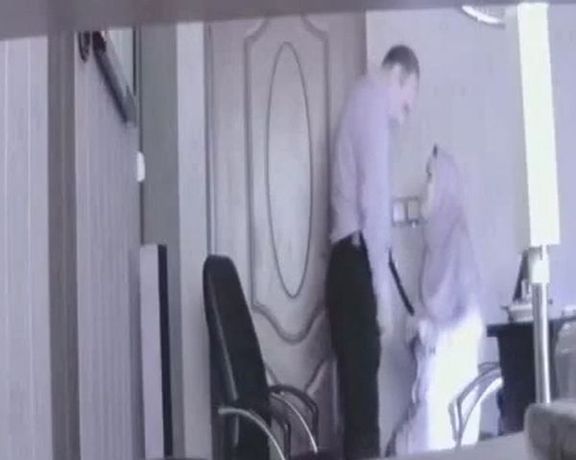
Amid hijab crackdown targeting women in Iran, videos showing Islamic regime officials engaging in illicit sexual relations circulate on social media.

Amid hijab crackdown targeting women in Iran, videos showing Islamic regime officials engaging in illicit sexual relations circulate on social media.

Iran's top Sunni cleric Mowlavi Abdolhamid has compared protests in Iran and Israel, noting that Prime Minister Benjamin Netanyahu did not kill any protesters.
Abdolhamid, who has emerged as an outspoken critic of the regime in the past year, made the remarks during his Friday prayer sermons, referring to large-scale protests underway in Israel since early 2023 in response to the ruling government's push for a wide-ranging judicial overhaul.
In Israel, 123 protesters were injured and about 700 people were arrested since January. In Iran, well over 500 protesters were killed by regime’s agents while the number of the injured – including those who lost eyesight – is so high that cannot be estimated. At least 22,000 were arrested, with seven executed and some on death row on trumped up charges.
Comparing how the Israeli government is handling the protests with what the Islamic Republic is doing, he said, "It's astonishing that in Israel, not even one person from the protesters and forces opposing the government has been killed. Israel kills Palestinians but not its own people. They differentiate between their own nation and others. But why isn't it the same here?"
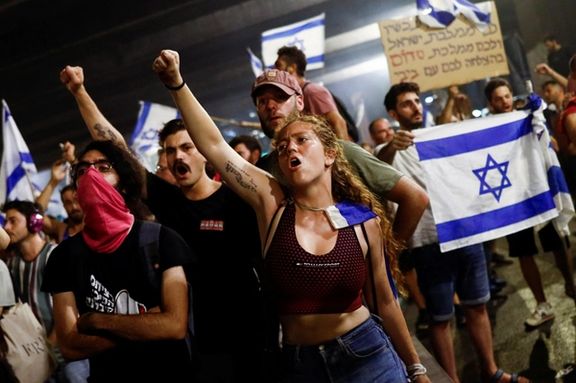
Abdolhamid said, "Everyone in Israel has revolted and protested that Netanyahu wants to lead the government towards dictatorship. Pilots and reserve army forces have resigned because they don't want to defend a dictatorship,” implicitly calling on Iranian military officials to break their silence in the face of injustices.
The cleric rebuked the authorities who continue to threaten people to discourage them from further demonstrations as the anniversary of anti-regime protests approaches in mid-September, and the regime has intensified its intimidation campaign. "Recently, one of the Basij commanders said that if there is another protest, we will suppress it. Suppressing the people is not the right approach. The Basij should listen to the people's grievances.People have problems; they are hungry; they are humiliated and are stuck in a deadlock.”
He condemned those officials who are not independent in their decisions and turn a blind eye to the country’s problems and corruption, emphasizing that there are no prospects for a better future for Iran. Referring to the inability of the government to deal with Iran's critical issues, he said, "Day by day, the country's crises deepen, and the nation is facing endless problems. Now, with the arrival of a new parliament and administration, are these problems supposed to be resolved," Abdolhamid said referring to parliamentary elections in March.
"If there is no bright prospect and the new parliament will only repeat the same old tactics, while people's vote would have no impact, it will be all futile," he added.
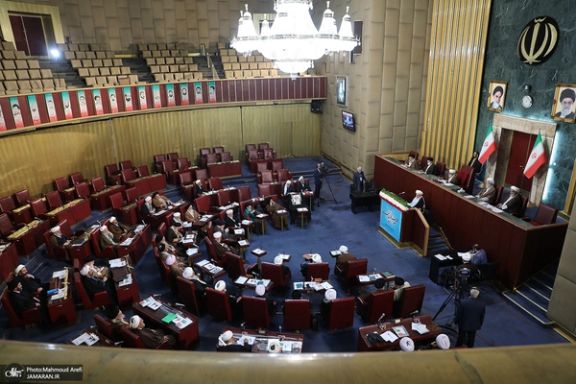
Implicitly alluding to Iran's leader Ali Khamenei, he emphasized the necessity for all individuals, regardless of their status, to be subject to accountability without being treated as untouchable "red lines." He labeled this issue as the regime's "greatest danger," condemning the reluctance of senior officials to heed the grievances of the people, especially those whose identities remain concealed from public discourse. Critically assessing the Assembly of Experts for Leadership—an authoritative body responsible for appointing the Supreme Leader—Abdolhamid asked, “What is the purpose of this council if its members cannot oversee the organizations and institutions under Khamenei’s control?”
The forthright Sunni leader remarked that unless there is a shift in perspectives and policies, coupled with substantial transformation that genuinely serves the people, the ongoing challenges will endure. He stressed that merely altering parliamentary representatives, the Assembly of Experts, or the presidency will not suffice to address these persistent issues.
Following his sermons, people in several Sunni majority cities in Sistan-Baluchestan, including the provincial capital Zahedan, poured onto streets and chanted slogans to demand the release of political prisoners. Residents have been protesting every Friday since last September when sucurity forces killed around 90 civilians during a Friday protest.

The Tehran Clothing Manufacturers and Retailers Association has forced clothing business owners to attend workshops to manufacture products based on Islamic rules.
Abdol-Qasem Shirazi, the association's spokesperson, said his group is committed to promote the mandatory hijab.
Shirazi stated, "At the association's dedicated training center, clothing business proprietors and suppliers are imparted with essential insights into the principles of modesty and hijab. These workshops serve as a platform for participants to gain a comprehensive understanding of these cultural values. Additionally, participants are honored with certificates of attendance, symbolizing their engagement in this important discourse."
He further threatened that through inspection campaigns backed by government agents, the association will continue to enforce adherence to mandatory hijab regulations.
“Instances of non-compliance are addressed decisively, with some non-conforming businesses facing temporary closures.”
In a related context, Iran's Cyber-Police (FATA) recently issued warnings to businesses such as women's fashion boutiques, surgery clinics, and gyms, cautioning them against sharing unveiled photos in their social media content.
The movement of defiance against compulsory hijab has gained momentum, especially following the tragic death of Mahsa Amini, a 22-year-old woman who received fatal injuries while in custody of the morality police for "improper hijab." Her case ignited nationwide protests, drawing attention to the ongoing discourse around hijab rules.
The government's response to these protests has included measures such as restricting the use of public transportation, access to government premises, and boarding flights for those deemed defiant. Additionally, certain establishments, including shops and shopping malls, have been temporarily shut down.
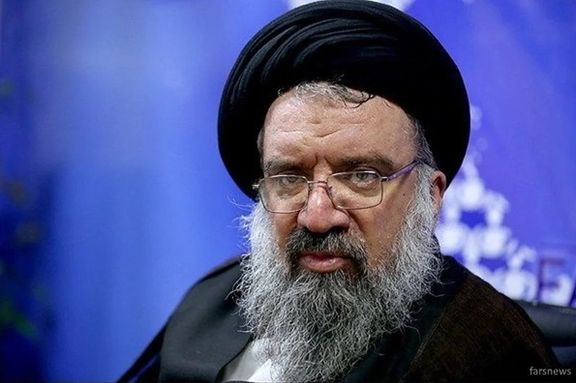
Ahmad Khatami, Friday Prayers Imam in Tehran, has issued a warning to protesters, not to hold demonstrations next month at the anniversary of last Year's protests.
Khatami stated during his Friday sermon, "Throughout these years, enemies have managed to do whatever they could, and even in recent riots, they claimed they came to overthrow, but ended up being overthrown and defeated."
Supreme Leader Ali Khamenei's frequent usage of the term "Enemies" to denote nations like the United States, Israel, and their allies in Europe, underscores the narrative that persists within Iran's leadership.
Khatami's threat intensified as he declared, "If they intend to engage in mischief, they will be punched in the mouth." The interim Friday Prayer Leader of Tehran further reinforced the message, stating, "If they still cling to illusions, they must recognize that they will face destruction and must unequivocally accept this reality."
Meanwhile, Iranian President Ebrahim Raisi recently issued a statement addressing protests against the compulsory hijab, asserting that these actions are being driven by foreign influence. Raisi emphasized a strategic response to quell the demonstrations, prompting speculation of a more robust crackdown on those challenging the hijab policy.
Raisi's assertion regarding the hijab policy is noteworthy considering the persistent defiance of Iranian women and girls against the mandated headscarf. This movement, colloquially known as "the removal of the hijab," has gained momentum despite the state's efforts to suppress it. The upcoming anniversary of the tragic death of Mahsa Amini while in custody of the morality patrol serves as a somber reminder of the ongoing tensions surrounding this issue.
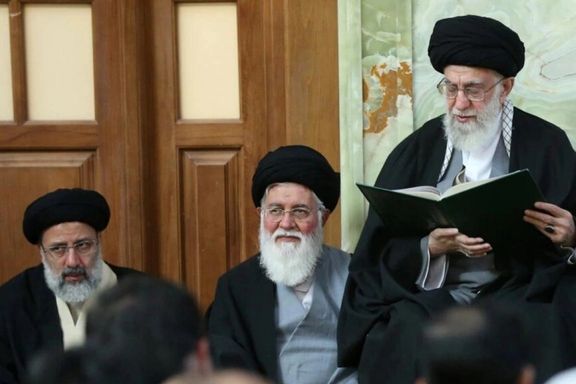
A firebrand senior ayatollah in Iran has called the release of Iran’s frozen funds by the United States “a humiliation” and a “ransom” in exchange for “their spies.”
Ahmad Alamholhoda, who is close to Iran’s ruler Ali Khamenei and is the father-in-law of President Ebrahim Raisi was speaking during his Friday prayer sermon, August 18, in the religious city of Mashhad.
The hardliner ayatollah said that the ransom was paid not because of humanitarian concern for the hostages, but to prevent “their espionage secrets” to be publicized by Iran’s “interrogation” of the prisoners.
“They accepted to return $6 billion of Iran’s money with humiliation, pay ransom and take back their spies,” Alamolhoda said, while mocking “Westernized” Iranians for pinning their hopes on the United States and Europe.
Earlier this month, Iran announced it had reached agreement with the Biden administration to release five dual national American citizens it had arrested and convicted for espionage and related charges in sham trials, n exchange for $6 billion frozen in South Korea due to US sanctions.
The deal has led to sharp criticism and questioning by US lawmakers and many Iranian Americans, who say the Biden administration made a deal in secret and it is not clear what other concessions it has made to the Islamic Republic. Many critics also say that payment of ransom for hostages will endanger the lives of other Americans by emboldening the Iranian regime and other adversaries.
Alamolhoda addressing Iranians whom he called Westernized said, “Are you pinning your hopes on the gates of the West and expect their help? These are impure cowards who for a few spies,” are willing to be humiliated.
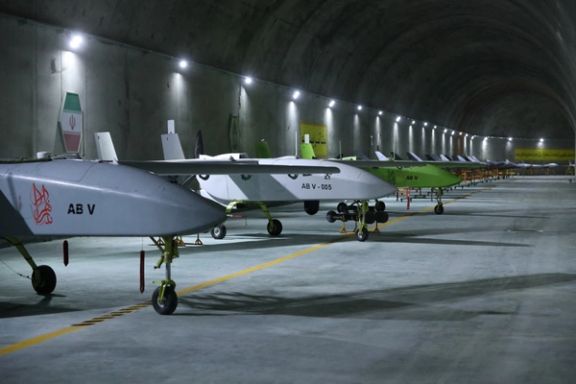
The Washington Post has revealed that Russian drone engineers had to take shelter in a Tehran hotel after an alleged Mossad strike on Iran's drone facility.
The newspaper obtained leaked documents that reveal Russian industrial experts were in Tehran for a joint attack drone operation and were forced to take shelter in their hotel after a reported attack on a Shahed-136 UAV production facility in Esfahan, central Iran.
The Iranian authorities were reportedly concerned about the possibility of additional strikes on drone facilities in Tehran, which the Russian experts were scheduled to visit.
The leaked materials, originating from a source within a specialized Russian facility working on drone production, showcased a project aiming to manufacture 6,000 drones by the summer of 2025.
In June, the US intelligence community revealed that Iran was assisting Russia in establishing a drone manufacturing plant in Russia's Alabuga special economic zone, raising concerns about potential military applications.
While the project encountered delays and difficulties, including staffing shortages in key areas of drone development, experts suggest that Russia is making strides toward enhancing its drone capabilities beyond those of the Shahed-136.
Despite the revelations, neither the Russian government, Iran's UN mission, nor the Alabuga facility responded to requests for comment. The United States and its allies have implemented measures to curtail the transfer of drone-related components to Russia and Iran.
In the latest incident, a video surfaced on a Telegram channel showing a sexual encounter purportedly involving Mohammad Masoudianfar, a high-ranking state broadcaster (IRIB) official. The video is said to have been recorded secretly in his office.
It has been reported that both individuals featured in the video are married and have children. Intriguingly, both figures are associated with the Basij forces. Additionally, Masoudianfar holds a senior role within the state Television department dedicated to promoting hijab.
Notably, the state-run broadcasting organization operates under the oversight of Supreme Leader Ali Khamenei.
In recent weeks, a Telegram channel named Radio Gilan, administered by Payman Behboudi, a journalist based in Germany, has released a series of videos that have ignited significant controversy within Persian social media circles.
The unfolding controversy initially gained attention with the release of a video allegedly depicting Reza Seqati, a director from Iran's Ministry of Culture, engaged in a sexual act with a young man. Subsequently, Seqati was dismissed from his position after the video of his explicit encounter was leaked online.
Iran's sharia-based penal code prescribes severe punishments for various forms of sexual acts. between adult men can lead to the death penalty.
Furthermore, sexual acts categorized as Zena, involving married men and women, are subject to stoning and death penalties under the prevailing legal framework.